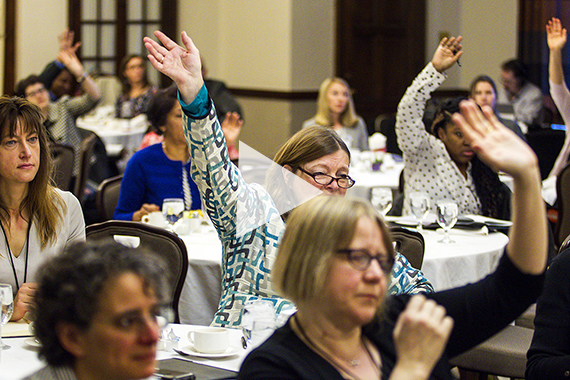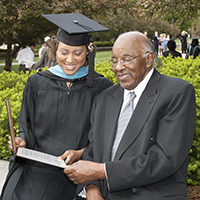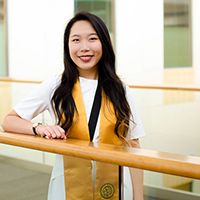 With "Bridging the Research to Practice Gap" as its theme, this year's biennial conference highlighted the disparity in the number of men and women filling leadership roles, pay inequity, promotion rates and other biases ingrained into business cultures and practices. (Photo by Nate Chute)
With "Bridging the Research to Practice Gap" as its theme, this year's biennial conference highlighted the disparity in the number of men and women filling leadership roles, pay inequity, promotion rates and other biases ingrained into business cultures and practices. (Photo by Nate Chute)
We, Too
Academics, executives focus on ‘breaking bias’ at Purdue Conference
In the wake of the #MeToo social media movement, which exposed the prevalence of sexual harassment and gender discrimination in the workplace, a March 2018 conference at Purdue University’s Krannert School of Management served as a call to action among companies in the United States.
Ellen Ernst Kossek, Basil S. Turner Professor of Management and research director of the Susan Bulkeley Butler Center for Leadership Excellence, was the lead organizer of the three-day conference. Called “Breaking Bias: Leadership Excellence and Gender in Organizations,” its theme was “Bridging the Research to Practice Gap.”
Featuring prominent scholars and corporate leaders dedicated to achieving diversity and inclusion in the workplace, especially in the top ranks of businesses and government, the conference highlighted the disparity in the number of men and women filling leadership roles, pay inequity, promotion rates and other biases ingrained into business cultures and practices.
“Decades of research have exposed the pitfalls facing women seeking career success, although employment and human resource strategies nationwide have yet to catch up,” Kossek says. Women, for example, compose fewer than 5 percent of CEOs, fewer than 20 percent of board directors in S&P 500 companies and about 20 percent of seats in the United States Congress.
“Much progress remains to be made in creating more inclusive cultures, particularly when it comes to diversity and gender discrimination,” she says. “If you get women into companies and policies aren’t improved, those employees are going to leave. That’s expensive to society, it’s costly to families and it’s costly to individuals when they undergo discrimination. It’s a waste of money.”
During the conference, researchers gained first-hand knowledge of the challenges and questions faced by corporations, and companies learned the latest findings and recommendations found both in academic research and in the best practices of their peers.
“What made this event unique is that it is one first conferences that’s really tried to address the research-to-practice gap,” Kossek notes. “We had researchers highlighting the problems — the discrimination and the failure to make change in society — and then we had the companies that are striving, but often facing persistent barriers, to implementing effective programs.
“This was really an in-depth, thoughtful look at gender and diversity, not just hype. Our overarching goal was to identify evidence-based solutions and have an open dialogue between scholars and employers — something that is, unfortunately, too infrequently done.”
A special issue of refereed journal articles on women’s career equality edited by Dr. Kossek and Patrice Buzzanell, the former director of the Butler center, will be published this year in Human Resource Management.
Toward that end, the conference began with a public panel discussion and audience Q&A titled “Work, Gender, Diversity and the Power of Your Voice” that was moderated by Candice Lange, director of Purdue’s Jane Brock-Wilson Women in Management Center.
Panelists included Stacy Blake Beard, the Deloitte Ellen Gabriel professor of women and leadership at Simmons College; Christine Krull, head of diversity and inclusion for Roche Diagnostics; Quinetta Roberson, the Fred J. Springer Endowed Chair in Business Leadership at Villanova University; Pramukh Jeyathilak; global human resources lead at Amazon; and Krannert faculty member Meara Habashi, assistant head of the Department of Management and a research fellow in the Women in Management Center.







